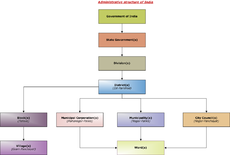- National Democratic Alliance (India)
-
"NDA" redirects here. For other uses, see NDA (disambiguation).
Republic of India Part of the series
Politics and Government of India- National Parties
- State Parties
- National Coalitions:
- Left Front
- National Democratic Alliance (NDA)
- United Progressive Alliance (UPA)
- Governor
- State Legislature:
- Vidhan Sabha
- Vidhan Parishad
- Panchayat
- Gram panchayat
- Panchayat samiti
- Zilla Parishad

- Other countries
- Politics Portal
- Government of India Portal
centre-right coalition of political parties in India. At the time of its formation in 1998, it was led by the Bharatiya Janata Party (BJP) and had thirteen constituent parties. Its convenor is Sharad Yadav, and its honorary chairman is former prime minister Atal Bihari Vajpayee. Also representing the alliance are Sushma Swaraj, a former home minister; Arun Jaitley, leader of the opposition in the Rajya Sabha; and Karia Munda, the deputy speaker in the Lok Sabha. Contents
History
The announcement of the National Democratic Alliance in May 1998 signaled the first step in the building of the coalition, which formed the government in 1998, but collapsed within a year because the All India Anna Dravida Munnetra Kazhagam (AIADMK), a state political party in the states of Tamil Nadu and Puducherry, pulled out. It proceeded to win the 1999 elections with a greater majority and new alliances. The NDA governed under A.B Vajpayee for a full five years, and hence, and was widely expected to win the 2004 elections. However, post-elections, a coalition led by the main opposition Congress party staked a claim to form the government with support from non-aligned parties. The formation of the United Progressive Alliance, the Congress-led coalition, was inspired by the structure of the NDA, with one major national party at the helm and several regional parties participating.
Structure
Given the tendency of political parties in India to make and break alliances frequently, the National Democratic Alliance does not have a formal governing structure in place, such as an executive board or politburo. It has been up to the leaders of the individual parties to make decisions on issues such as sharing of seats in elections, allocation of ministries and the issues that are raised in Parliament. Given the varied ideologies among the parties, there have been many cases of disagreement and split voting among the allies. Owing to ill health, George Fernandes, who was the NDA convener[when?], was discharged of his responsibility and replaced by Sharad Yadav who is the National President of the JD(U)[clarification needed].[1]
Past and present members
Currently, the thirteen parties in the NDA are:[2]
- Bharatiya Janata Party (116 MPs)
- Janata Dal (United) - Bihar and Karnataka (20 MPs)
- Shiv Sena - Maharashtra (11 MPs)
- Shiromani Akali Dal faction led by Parkash Singh Badal - Punjab (4 MPs)
- Telangana Rashtra Samithi - Andhra Pradesh (2 MPs)
- Asom Gana Parishad - Assam (1 MP)
- Nagaland People's Front - Nagaland (1 MP)
- Uttarakhand Kranti Dal - Uttarakhand
Former members of the National Democratic Alliance, who have left the alliance:
- Jammu & Kashmir National Conference - Withdrew in 2002, blaming the BJP for its loss in the Jammu and Kashmir state elections. Omar Abdullah, son of former J&K Chief Minister Farooq Abdullah, served as a Minister of State for External Affairs.[when?]
- Lok Jan Shakti Party - Withdrew following 2002 Gujarat religious riots. Its leader, Ram Vilas Paswan, served as the cabinet-level Communications, and later, Coal Minister.
- Marumalarchi Dravida Munnetra Kazhagam - Joined the Congress Party during 2004 elections.
- Dravida Munnetra Kazhagam - Joined the Congress party during 2004 elections.
- All India Anna Dravida Munnetra Kazhagam - Joined with Congress Party during 1999 elections; subsequently re-joined alliance during 2004 elections, but did not remain aligned post-defeat. Joined the Third Front before the 2009 elections.[3]
- Pattali Makkal Katchi - Joined with Congress Party for the 2004 elections.
- Indian Federal Democratic Party - Its leader, P.C. Thomas, was a minister in the Vajpayee government and the only member of parliament in the alliance from Kerala. Following the 2004 election, he merged his party with the Kerala Congress, which is aligned with the Left.
- Trinamool Congress - West Bengal - Withdrew from the alliance at the end of 2007. Joined the Congress party before the 2009 elections.
- Biju Janata Dal - Orissa - Left the alliance just over a month before the 2009 elections.
- Indian National Lok Dal-Left due to seat sharing disagreements during Haryana assembly elections 2009.
- Rashtriya Lok Dal led by Ajit Singh - Uttar Pradesh has allied with Congress for 2011 U.P elections
Parties who gave outside support, but are no longer allies:
- Telugu Desam Party - In the monsoon session of parliament of 2005, the TDP decided not to continue as part of an NDA boycott of parliament. Speculation of an end to the NDA-TDP relationship was confirmed in August of that year, when the BJP and TDP contested local elections in Andhra Pradesh on their own. The TDP was the founding member of the Third Front in 2009.[4]
Past General Election Alliances of BJP (NDA)(Before 2004)
Election Year Prime Minister Candidate Parties 1998 A B Vajpayee Bharatiya Janata Party
AIADMK
Samata Party
Biju Janata Dal
Shiromani Akali Dal
All India Trinamool Congress
Shiv Sena
Pattali Makkal Katchi
Lok Shakti
Marumalarchi Dravida Munnetra Kazhhagam
Haryana Vikas Party
Janata Party
Mizo National Front1999 A B Vajpayee 2004 A B Vajpayee 2009 L. K. Advani Seat sharing arrangements for the 15th Lok Sabha
The BJP has allied with various parties before the 15th Lok Sabha. Most of the parties with which it has tied are already listed above. The BJP and Shiromani Akali Dal in Punjab, BJP and Rashtriya Lok Dal in Uttar Pradesh, BJP and Janata Dal (United) (JD(U)) mainly in Bihar but also in many other states. In those states the JD(U) does not have presence but it will be given two or three seats. The BJP and Asom Gana Parishad have a tie in Assam. The BJP and the Shiv Sena tie in Maharashtra. Other small parties like NPF, GJM, KPP and Uttarakhand Kranti Dal may get very few seats or may not contest at all. In the state of Tamil Nadu where the BJP is in disarray. Senior BJP leader Venkaiah Naidu has stitched up a seven-party front with the BJP at its head. This front consists of small parties who are unlikely to win any seats. In fact The BJP itself has won only four seats as their best performance in the state which has 39 seats. The following is a list of parties in this front and how many seats they will contest:
- BJP - thirteen seats
- JD(U) - two seats
- All India Samathuva Makkal Katchi - led by actor Sarath Kumar - five seats
- Nadalum Makkal Katchi - led by actor Karthick - two seats
- Janata Party - led by Dr.Subramaniam Swamy - no seat
- Puzthiya Tamilzham Katchi - no seat
- Bharatiya Forward Bloc - no seat
Constituents (2009 election)
Before the election, the NDA comprised the following constituent parties:
Parties Bhartiya Janata Party Shiv Sena Janata Dal (United) Shiromani Akali Dal Indian National Lok Dal Rashtriya Lok Dal Asom Gana Parishad[5] Nagaland People's Front Gorkha Janmukti Morcha Uttarakhand Kranti Dal Kamtapur Progressive Party Ladakh Union Territory Front Mizo National Front Telangana Rashtra Samithi[6] Former Members (after the 2004 election) All India Anna Dravida Munnetra Kazhagam (joined the Third Front) Telugu Desam Party (joined the Third Front) Trinamool Congress (joined the United Progressive Alliance) Biju Janata Dal (joined the Third Front) Indian Federal Democratic Party (merged with Kerala Congress) See also
References
- ^ http://www.lkadvani.in/eng/content/view/677/281/
- ^ Small parties, independents in great demand. Retrieved on July 15, 2008.
- ^ "Third Front is born, asks for nation's trust". http://ibnlive.in.com/news/third-front-is-born-asks-for-nations-trust/87451-37.html?from=rssfeed. Retrieved 2009-03-12.
- ^ "Third Front is born, asks for nation's trust". http://ibnlive.in.com/news/third-front-is-born-asks-for-nations-trust/87451-37.html?from=rssfeed. Retrieved 2009-03-12.
- ^ The AGP has formed a seat-sharing agreement with the BJP in Assam, but has indicated that it does not intend to formally join the NDA."AGP announces its candidates for Lok Sabha polls". The Hindu. March 9, 2009. http://www.hindu.com/thehindu/holnus/004200903091531.htm. Retrieved 2009-03-09.
- ^ http://www.hindu.com/2009/05/11/stories/2009051157250100.htm TRS joins NDA
External links
Categories:- Political parties in India
- Political parties established in 1998
- Coalition governments
- Coalitions of parties in India
Wikimedia Foundation. 2010.
Look at other dictionaries:
National Democratic Alliance — The National Democratic Alliance is a name used by political parties of several countries: National Democratic Alliance for Egypt National Democratic Alliance (India) National Democratic Alliance (Georgia) National Democratic Alliance (Iraq)… … Wikipedia
National Security Council (India) — The National Security Council (NSC) of India is the apex agency looking into the political, economic, energy and strategic security concerns of India. It was established by the A B Vajpayee government on 19 November 1998, with Brijesh Mishra as… … Wikipedia
National Democratic Party (Egypt) — National Democratic Party الحزب الوطني الديمقراطى First leader Anwar El Sadat Last leader Talaat Sadat … Wikipedia
Meghalaya Democratic Alliance — Republic of India Part of the series Politics and Government of India … Wikipedia
Rashtriya Democratic Alliance — (National Democratic Alliance), was a front of five political parties contesting the 2001 state legislative assembly elections in the Indian state of Assam. RDA included Nationalist Congress Party, Asom Jatiya Sanmilan, Asom Gana Sangram Parishad … Wikipedia
National Assembly of Kuwait — 11th Sesion Type Founded 1963 … Wikipedia
Indian National Democratic Congress — The Congress Reform Committee was formed by a group of dissidents that left the Indian National Congress in the Madras State. The CRC was led by C. Rajagopalachari, who had been defeated by Kamaraj in the inner party disputes over leadership of… … Wikipedia
India Shining — was a political slogan referring to the overall feeling of economic optimism in India after plentiful rains in 2003 and the success of the Indian IT boom. The slogan was popularized the then ruling Bharatiya Janata Party (BJP) for the 2004 Indian … Wikipedia
United Democratic Front (India) — United Democratic Front (UDF) is an alliance of progressive, pro development political parties of Kerala state in India. This alliance is led by the Indian National Congress.UDF has ruled Kerala for many terms and under its rule the alliance… … Wikipedia
India — /in dee euh/, n. 1. Hindi, Bharat. a republic in S Asia: a union comprising 25 states and 7 union territories; formerly a British colony; gained independence Aug. 15, 1947; became a republic within the Commonwealth of Nations Jan. 26, 1950.… … Universalium
Share the article and excerpts
Direct link
https://en-academic.com/dic.nsf/enwiki/232263 Do a right-click on the link above
and select “Copy Link”
National Democratic Alliance (India)
- National Democratic Alliance (India)
-
"NDA" redirects here. For other uses, see NDA (disambiguation).
Republic of India Part of the series
Politics and Government of India- National Parties
- State Parties
- National Coalitions:
- Left Front
- National Democratic Alliance (NDA)
- United Progressive Alliance (UPA)
- Governor
- State Legislature:
- Vidhan Sabha
- Vidhan Parishad
- Panchayat
- Gram panchayat
- Panchayat samiti
- Zilla Parishad

- Other countries
- Politics Portal
- Government of India Portal

